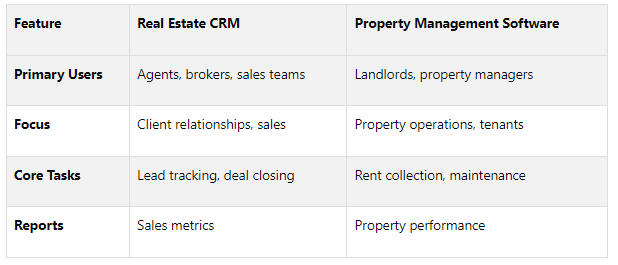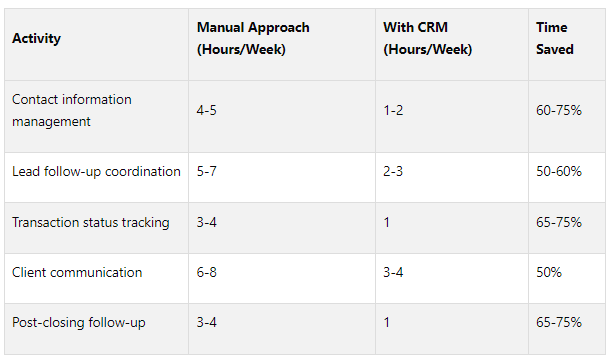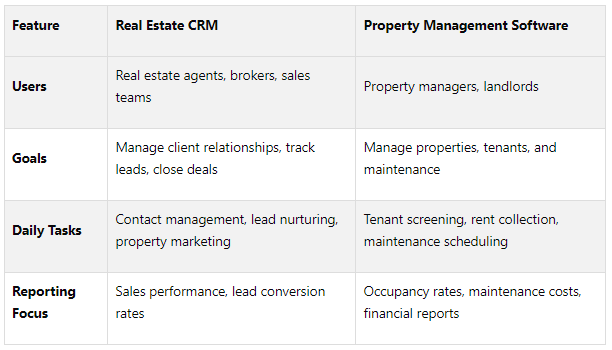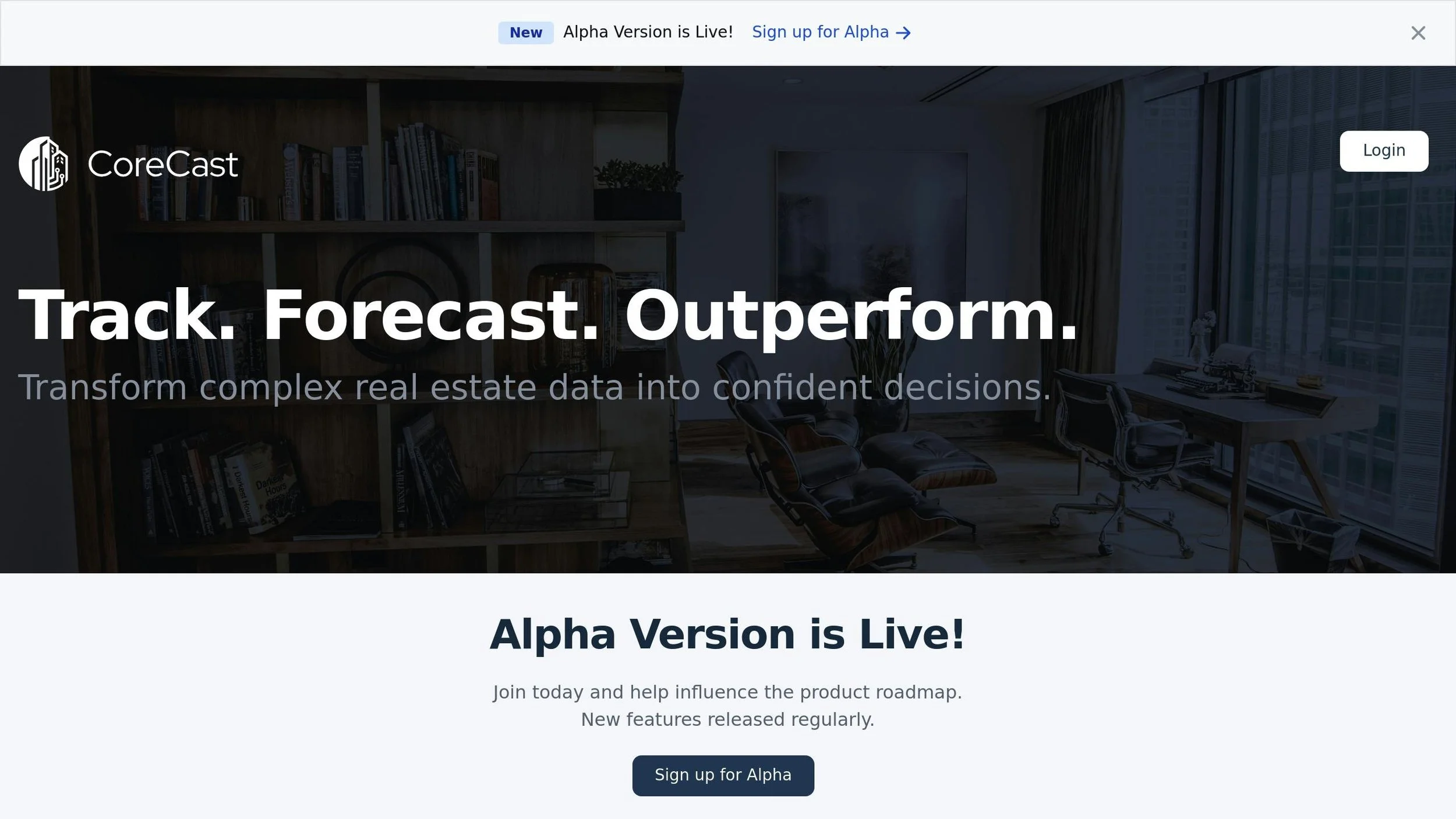Real Estate CRM vs Property Management Software
Real Estate CRM and Property Management Software are two essential tools in the real estate industry, but they serve different purposes. CRMs are designed to help real estate agents manage leads, track sales pipelines, and nurture client relationships. In contrast, property management software focuses on property operations - like rent collection, tenant communication, and maintenance coordination - for landlords and property managers.
Key Takeaways:
Real Estate CRM: Ideal for sales-focused professionals managing clients and deals.
Property Management Software: Best for landlords and managers handling rental properties and tenants.
Picking the wrong tool can disrupt workflows and hurt efficiency, so understanding your needs is critical.
Quick Comparison:
Choosing the right software depends on whether your focus is on closing deals (CRM) or managing properties (PMS). For businesses handling both, integrating these tools can create a more efficient workflow.
Is A CRM Useful For Property Managers? - CountyOffice.org
What Are Real Estate CRM Systems
Real Estate CRM systems are purpose-built platforms designed to address the specific needs of the real estate industry. Unlike general business software, these systems cater to property transactions and the often lengthy, intricate sales cycles that involve multiple parties.
They help brokers, agents, and investment teams manage and nurture leads over time. In fact, 72.5% of real estate professionals now rely on CRM systems in their daily operations. The market for real estate CRM software is expected to grow significantly, from $10.81 billion in 2023 to $17.13 billion by 2030.
What sets real estate CRMs apart is their focus on relationship-driven sales. Considering that over 80% of real estate transactions stem from referrals or repeat clients, these tools are designed to strengthen client connections and foster long-term loyalty.
Let’s explore the key features that make real estate CRMs essential for streamlining operations.
Main Features of Real Estate CRM
Real estate CRMs come packed with tools tailored to the challenges agents and brokers face daily. Some of the most impactful features include:
Lead Management: Consolidate leads from websites, open houses, social media, and referrals into one organized system.
Sales Pipeline Tracking: Use customizable deal boards to monitor each client’s progress, from initial contact to property showings, offers, and closing.
Automated Communication: Automate follow-ups with personalized emails, appointment reminders, and notifications triggered by client actions. Task reminders ensure agents stay on top of important deadlines.
MLS Integration: Sync seamlessly with Multiple Listing Services (MLS) to share property details without manual data entry.
The time savings these features provide are substantial, as shown below:
Beyond these core functions, many CRMs offer integrations with accounting and transaction management tools, along with detailed reporting. These reports provide insights into conversion rates, average days on market, commission tracking, and client lifetime value - all invaluable for data-driven decision-making.
How Real Estate Professionals Use CRM Systems
Real estate professionals turn to CRM systems to simplify client management and create a more organized workflow. According to data, sales teams that consistently use CRMs are 81% more likely to achieve higher effectiveness.
By centralizing client information, agents can easily access detailed profiles that include contact details, property preferences, budgets, history, and important dates. Automated lead nurturing campaigns keep clients engaged by delivering market updates, alerts for new listings, and helpful educational content. Performance tracking tools help agents evaluate which lead sources are most effective and monitor conversion rates.
CRMs also streamline scheduling, automating appointment confirmations and syncing with calendars to reduce no-shows. Team collaboration improves as well, with shared platforms that track client interactions and assign follow-up tasks, ensuring consistent service across the board.
Post-closing follow-ups are another standout feature. Automated sequences - such as anniversary reminders, market updates, and referral requests - help agents maintain long-term relationships. This is especially important in an industry where repeat business and referrals account for a significant portion of transactions.
What Is Property Management Software
While CRM systems focus on building and maintaining client relationships and driving sales, Property Management Software (PMS) takes a different approach. It’s all about operational efficiency after the lease is signed. PMS is designed to handle the nitty-gritty of rental property management - overseeing tenant relationships, daily operations, and ensuring properties remain profitable.
This software is a go-to solution for property managers, landlords, and investors managing rental portfolios. It’s no surprise that the market for these tools has grown significantly, with over half of property managers reporting a noticeable drop in operating costs after adopting PMS solutions.
“Property Management Software covers those needs: the more the presented sectors centralize their activities within the property asset, the more they will be able to boost performance, control schedules, and measure the progress, which will have a positive impact on the client/tenant experience.”
One of the biggest shifts in the industry is the move toward cloud-based property management. This trend has reduced reliance on physical offices while improving data security. PMS tackles key challenges like time management, tenant communication, maintenance coordination, financial tracking, and compliance with regulations. These fundamental capabilities pave the way for a more streamlined and data-driven approach to managing properties.
Main Features of Property Management Software
PMS brings together various operational tasks into one platform, addressing some of the most time-consuming aspects of property management:
Rent Collection and Financial Management
Handles rent collection, online payments, late fee reminders, and generates detailed financial reports automatically.Maintenance Request Management
Lets tenants submit maintenance requests online, assigns work orders to contractors, and tracks progress. Property managers can prioritize tasks and maintain communication with tenants and service providers.Tenant Screening and Lease Management
Offers tools for background checks, credit verification, and secure storage of lease documents. Tracks lease terms, renewal dates, and ensures compliance with local laws.Communication Platforms
Centralizes tenant communication through messaging systems, bulk notifications, and automated responses. Many systems also include mobile apps for 24/7 access.Document Storage and Compliance
Provides secure storage for sensitive documents and helps managers stay aligned with housing regulations.
The impact of these tools is substantial. For instance, Real-Time Consulting Services helped a multi-state property management company cut administrative tasks by 40% using automation. Similarly, PropTech leader RealEstateRocket reported a 213% boost in efficiency for companies using load-balanced systems. These streamlined processes not only make day-to-day operations smoother but also significantly improve overall management effectiveness.
How Property Managers Use These Tools
PMS transforms manual, time-consuming tasks into efficient, automated workflows, allowing property managers to focus on strategic priorities.
Property manager Joe Martin-Bindley shares, "Landlords who encourage tenants to switch to online rental payments get quicker payouts and have fewer late payments". This automation reduces late rents and improves cash flow.
When it comes to maintenance, Martin-Bindley explains, "After we assign priority to an issue, contractors deal directly with tenants. This allows us to work on the business rather than in it".
He also highlights the importance of clear communication: "Tenants want to be kept in the loop about their properties. Whether you're planning roof replacement at a multifamily apartment or scheduling repair work at an individual tenant unit, the software enables you to communicate clearly - in group and one-on-one - while creating a professional distance between you and your business".
The time saved by automating these tasks gives property managers the chance to focus on growth and higher-value activities. As Martin-Bindley puts it, "It frees up my time to focus on finding new tenants and growing my business". Additionally, PMS provides powerful reporting and analytics tools, offering insights into maintenance costs, tenant turnover, and overall property performance. These insights help managers make informed, strategic decisions to optimize their operations.
Transform Real Estate Data into Confident Decisions
Join Corecast to streamline your real estate operations, gain real-time insights, and make smarter investment decisions with a unified platform.
Real Estate CRM vs Property Management Software Comparison
After examining the core features of both systems, let’s break down their key differences to help you decide which one suits your needs best.
Real Estate CRM systems and Property Management Software serve very different purposes. CRMs are all about managing relationships with clients and streamlining the sales process, while property management tools focus on handling day-to-day property operations, tenant interactions, and maintenance tasks.
As Salesforce puts it:
“A real estate customer relationship management (CRM) system can help manage the complexity and ease the burden. These powerful tools organize and track all of your client and prospect information and interactions in one place.”
On the other hand, David Bitton, Co-founder at DoorLoop, emphasizes the operational side of property management software:
“With a great property management software tool, you can: Collect rent automatically, Track and manage all your property expenses from one place, Manage maintenance requests from beginning to end, even communicating directly with tenants, Post listings to major platforms automatically, Complete the entire leasing process online.”
Side-by-Side Feature Comparison
These differences highlight how each tool caters to distinct roles in the real estate industry.
CRMs are designed to simplify lead tracking and performance monitoring. They help agents schedule appointments, manage property listings, and oversee sales pipelines. Meanwhile, property management software focuses on operational tasks like lease tracking, maintenance management, and automated rent collection. It’s built to take the hassle out of everyday property management.
One key distinction lies in reporting. CRMs focus on sales metrics like conversion rates and agent performance, while property management software zeroes in on operational data such as occupancy rates and maintenance expenses.
Which Solution to Choose
Choose Real Estate CRM if you:
Work as a real estate agent or broker focused on sales
Need to manage leads and client relationships
Want tools to track property showings and deal pipelines
Are analyzing sales performance and conversion rates
Choose Property Management Software if you:
Manage rental properties or work as a landlord
Handle tenant relationships, maintenance requests, and rent collection
Need to track property expenses and occupancy rates
Focus on streamlining property operations
For many real estate businesses, combining both systems creates the ultimate workflow. In February 2024, MRI Software noted that integrating real estate sales CRM with property management software improves communication, simplifies processes, and boosts efficiency.
An expert in the field adds:
“Combining your real estate CRM system with your property management program will greatly improve the impression you give to your customers. Because all the information is easily available across platforms, integration allows you to respond to tenant questions and concerns faster.”
This integration doesn’t just make life easier - it opens up new opportunities. For example, property management interactions can help identify potential sales leads. It also automates repetitive tasks and optimizes workflows for property acquisition, leasing, and sales. Professionals Narellan & Districts even reported a 20% boost in efficiency after integrating their CRM system.
The numbers back this up. Over two-thirds of property managers now use tools like property management software, online rental listings, and electronic payments. Plus, 38% of renters say they’d like access to a resident portal for online payments and maintenance requests. This shows just how critical both relationship management and operational efficiency have become in today’s competitive real estate market.
CoreCast: Real Estate Intelligence Platform
While CRM and property management tools are great for handling day-to-day tasks, many real estate professionals find themselves needing more advanced tools for deal intelligence and portfolio analysis. That’s where CoreCast steps in. CoreCast is a real estate intelligence platform designed to complement your existing systems by providing the analytics and market insights that traditional tools often overlook.
CoreCast seamlessly integrates with your CRM and property management software, giving you a comprehensive view of your real estate investments and opportunities. From underwriting deals to tracking pipelines, analyzing portfolios, and staying connected with stakeholders, CoreCast brings everything together in one streamlined dashboard. Whether you're managing office buildings, retail properties, multifamily units, or industrial spaces, this platform supports a wide range of commercial real estate asset types, helping you stay on top of your game.
CoreCast Platform Features
CoreCast brings together essential functions into a single, user-friendly platform. Here’s what it offers:
Pipeline Tracker: Monitor every stage of your deals, from the initial prospecting phase to final closing. Along the way, you can incorporate financial modeling and assess risks, ensuring better decision-making at each step.
Portfolio Analysis: Dive deep into your property holdings with detailed performance metrics. Compare assets, evaluate historical market data, and uncover opportunities to optimize your portfolio.
Mapping System: Visualize your properties alongside competitors in the market. This feature helps you identify trends and make quicker, more informed decisions about potential acquisitions.
Stakeholder Center: Simplify communication with investors, partners, and other key players by creating and sending branded reports directly through the platform. No more manual report creation - it’s all handled within CoreCast.
Currently in beta, CoreCast offers three pricing tiers: Free, Essentials (US$75 per user/month), and Pro (US$100 per user/month), with a base rate starting at US$50 per user/month. The platform is also working on AI-driven automation, construction management tools, and advanced reporting features, which promise to make collaboration even easier with your existing systems.
How CoreCast Works with Other Real Estate Software
CoreCast bridges the gap between your existing tools, breaking down data silos and ensuring a seamless flow of information. By integrating with property management systems and CRM tools, it connects all aspects of your business - from sales to ongoing management - into one cohesive system.
Industry experts highlight the value of this integration, noting that connecting a real estate CRM with property management software improves data consistency and communication across teams. In fact, 74% of users report that CRM tools enhance access to customer data, enabling more personalized service.
The impact of this approach is evident in real-world examples. For instance, CasaGrand achieved 400 bookings in a single month, with half of those directly tied to CRM data. By linking CoreCast’s analytics to your existing systems, you gain richer insights, eliminate communication gaps, and unlock new opportunities for cross-selling and better client service.
For real estate professionals looking to elevate their technology stack, CoreCast adds powerful analytics and intelligence without disrupting your current workflows. It’s all about making faster, smarter decisions while maximizing the tools you already trust.
How to Choose the Right Software
Choosing the right software boils down to understanding your business priorities and daily operations. Whether you need a Real Estate CRM or Property Management Software depends on your focus - sales and client relationships versus property operations and tenant management. Let’s break it down.
Start by analyzing your core business activities. If your day revolves around prospecting, managing leads, and closing deals, a Real Estate CRM is your best bet. These systems shine at organizing property listings, streamlining client communication, and automating follow-ups with potential buyers or sellers.
On the other hand, if you’re focused on tasks like processing rental payments, tracking expenses, and ensuring compliance, Property Management Software is the way to go. This type of software is tailored for landlords and property managers, offering tools for rent collection, expense management, and tenant relationship upkeep.
Your team size and transaction volume also play a role. For smaller teams handling fewer transactions, a basic CRM might suffice. However, larger operations managing multiple properties and high deal volumes will benefit from more robust features. Think about how many deals you close each month compared to the number of properties you manage - it’s a good indicator of what you need.
Another factor to weigh is the cost-to-value ratio. The software you choose should integrate smoothly with tools you already use, like your email platform, accounting software, or Multiple Listing Service (MLS). For instance, Real Estate CRMs often connect with MLS to keep property listings current, while Property Management Software typically supports accounting and maintenance workflows. While CRMs might require a higher initial investment, they can pay off through improved lead conversion and deal tracking. Meanwhile, Property Management Software often comes with lower upfront costs but provides long-term savings through features like automated rent collection and maintenance scheduling.
As your business grows, you may find value in using both systems. Many real estate professionals start with a CRM to build their client base, then add property management tools as they expand into rental properties. The key is to pick software that meets your immediate needs but also offers room for future growth.
Lastly, consider the types of properties in your portfolio. Residential rentals, commercial properties, and vacation rentals all have unique requirements. Choose software that supports your specific market segment with features like payment processing, maintenance tracking, and tailored reporting. By aligning your software with your portfolio, you’ll ensure your tools grow alongside your business goals.
FAQs
-
The key distinction between Real Estate CRM and Property Management Software lies in their purpose and features. Real Estate CRMs are tailored for managing client relationships, tracking leads, and optimizing sales processes. They focus on tools like contact management, deal tracking, and marketing automation to help drive sales and nurture client connections.
In contrast, Property Management Software is built to handle the operational side of property management. This includes tasks like collecting rent, communicating with tenants, and tracking maintenance requests.
When deciding which solution is right for your business, consider your main objectives. If your priority is building strong client relationships and closing deals, a CRM is the better choice. However, if your focus is on managing the day-to-day operations of properties, Property Management Software will better suit your needs. Both solutions can enhance efficiency, but they serve distinct purposes within the real estate industry.
-
Integrating a Real Estate CRM with property management software can streamline operations by automating routine tasks such as data entry, scheduling follow-ups, and generating reports. This not only saves time but also frees up real estate professionals to focus on strategic priorities that drive business growth.
Another key advantage is the creation of a centralized hub for all critical information. With everything in one place, teams can respond to leads faster, manage properties and tenants more efficiently, and reduce the likelihood of errors. This integration leads to improved customer service and enables smarter, data-backed decision-making. The outcome? Smoother workflows and a better overall experience for both the team and their clients.
-
Real estate CRM systems are essential for strengthening client relationships. They centralize contact information, automate follow-ups, and make personalized communication easier. By using these tools, agents can maintain better connections with clients, build trust, and nurture lasting relationships.
On the sales side, CRMs enhance performance by simplifying lead management, highlighting the most promising opportunities, and automating routine tasks. This frees up agents to focus on what matters most - closing deals and boosting revenue. With these features, real estate professionals can streamline their processes and provide outstanding service to their clients.




